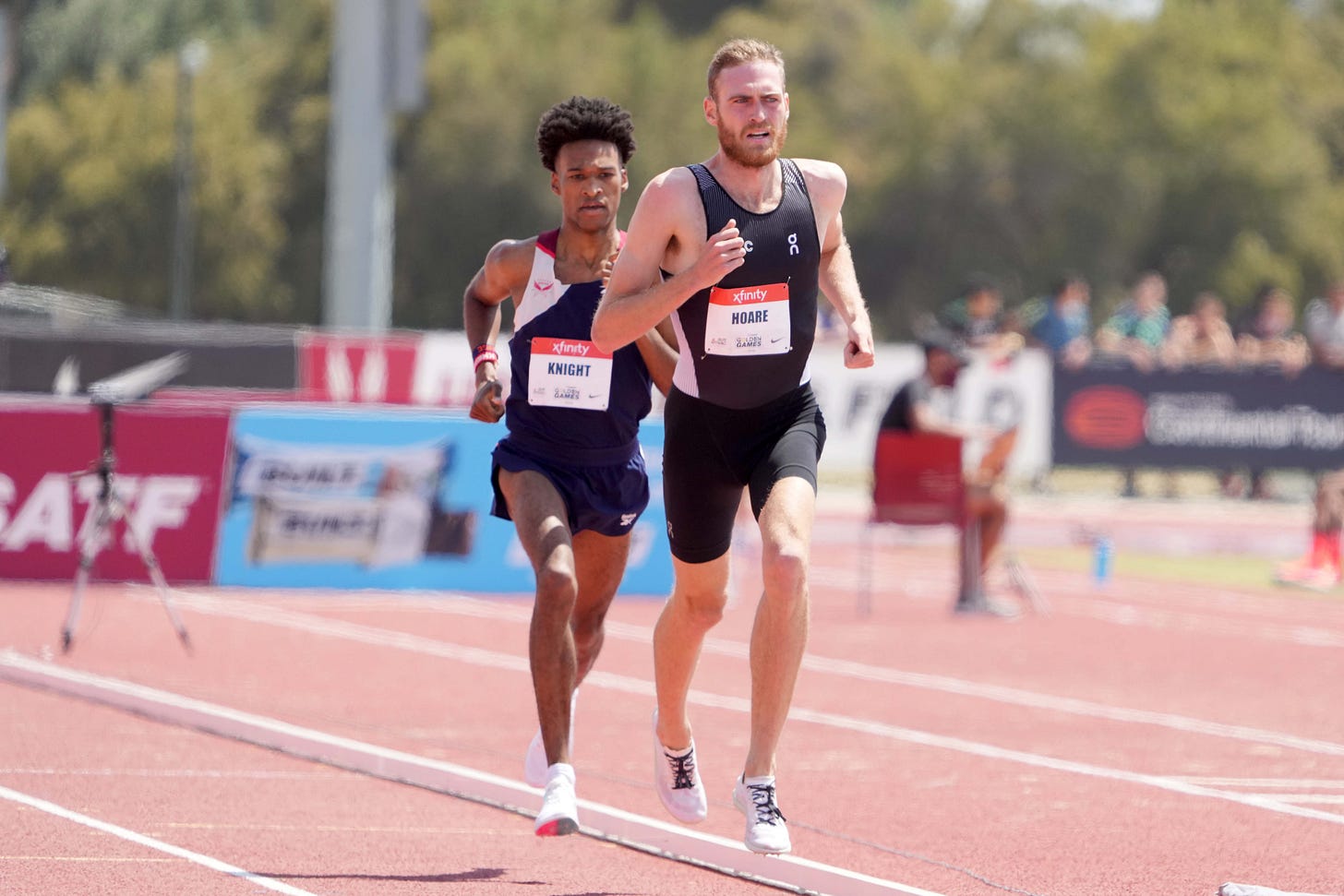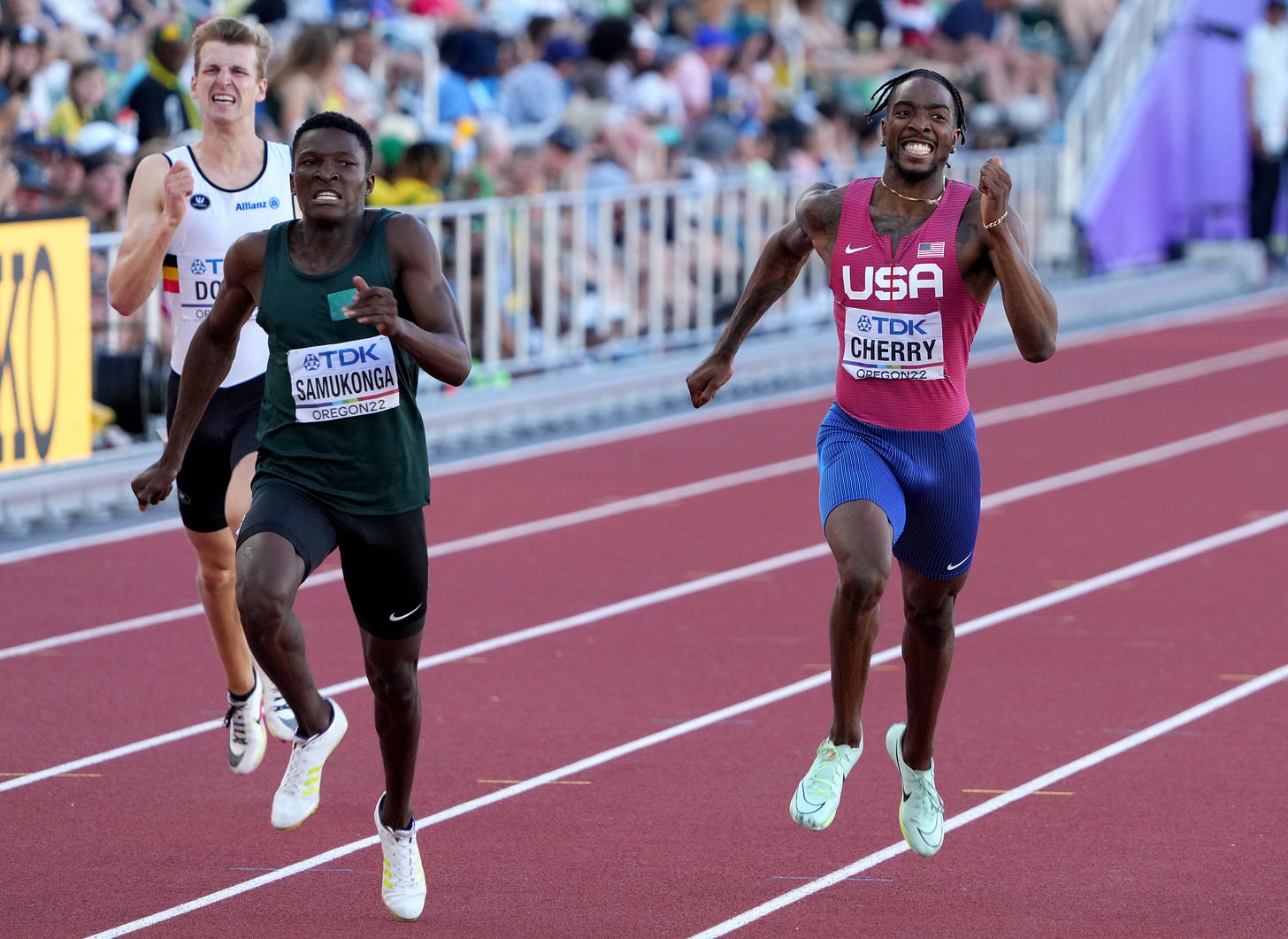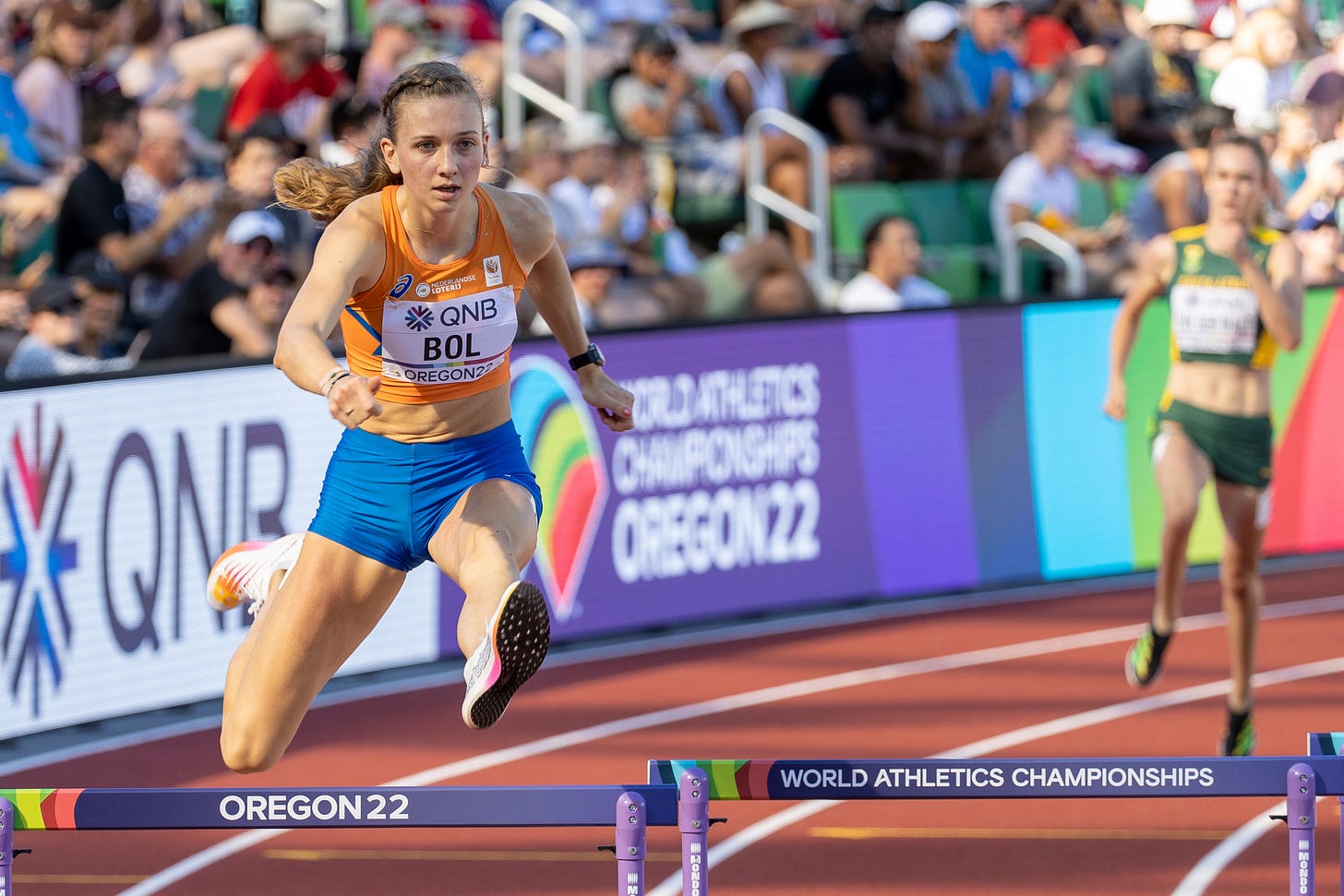Week in Review: Winds of change continue to blow in Commonwealth Games
Nadeem is latest non-European to win men's javelin in major international championship meet

Arshad Nadeem registered two significant firsts on the final day of the Commonwealth Games in Birmingham, England, on Sunday.
He became the first athlete from Pakistan in 60 years to win a gold medal in track and field in the quadrennial event that began in 1930. Athletes from 72 countries – including teams from England, Scotland, Wales, and Northern Ireland – took part in the multi-sport competition which was known as the British Empire Games from 1930-50, the British Empire and Commonwealth Games from 1954-66, and the British Commonwealth Games from 1970-74.
Nadeem was also the first athlete from South Asia to throw what is often referred to as the new-style javelin more than 90 meters. The new-style javelin, which is designed to travel shorter distances than the one used previously, has been in use since 1986.
Nonetheless, the 25-year-old Nadeem’s victory continued a trend that began in 2009 and has seen throwers from outside of Europe consistently win medals in major international competitions in the men’s javelin.
Prior to the 2009 World Athletics Championships in Berlin, throwers from European countries had won 30 of a possible 33 medals in the 11 previous World Championship meets.
And in the Olympics in which the javelin was contested from 1908-2008, Europeans had won 22 of the 23 possible gold medals and 64 of 69 possible medals.
Cy Young of the U.S. won the men’s javelin in the 1952 Olympics in Helsinki and Marius Corbett of South Africa won the event in the 1997 World Championships in Athens. But the European dominance in global title meets was basically unwavering until the 2009 World Championships when Guillermo Martinez of Cuba and Yukifumi Murakami of Japan won the silver and bronze medals behind gold medalist Andres Thorkildsen of Norway.
Following a third-place finish by Martinez in the 2011 World Championships in Daegu, South Korea, Keshorn Walcott of Trinidad and Tobago won the 2012 Olympic title in London, and three years later Julius Yego of Kenya and Ihab El-Sayed of Egypt finished 1-2 in the 2015 World meet in Beijing.
Yego and Walcott finished second and third in the 2016 Olympics in Rio de Janeiro, but Europeans took the top six places in the 2017 World Championships in London.
However, non-Europeans have won the last three global title meets as Anderson Peters of Grenada won the World Championships in Doha, Qatar, in 2019, and in Eugene, Oregon, last month, and Neeraj Chopra of India won the Olympic title in Tokyo last summer.
And for the first time ever in a global title meet, the majority (7) of the finalists (12) in last month’s World Championships at the University of Oregon’s Hayward Field were from countries outside of Europe.
Nadeem finished fifth in that meet, as well as in the Olympics. But he raised his national record three times during his victory in the Commonwealth Games.
His opening throw of 86.81 meters (284 feet 9 inches) gave him the lead and topped his previous best of 86.38 (283-5) set last year. He then threw 88.00 (288-8) on his third throw after fouling his second.
Peters, who had three throws over 90 meters while winning his second consecutive World title in Eugene, had a best of only 82.74 (271-5) after the first four rounds in Birmingham. But his 88.64 (290-10) toss on his fifth attempt briefly gave him the lead before Nadeem unleashed a 90.18 (295-10) throw a few minutes later to become the 23rd man to join the 90-meter club.
Yego finished third at 85.70 (281-2), with Walcott fourth at 82.61 (271-0).
Chopra, who raised his national record to 89.94 (295-1) earlier this season, did not compete in Birmingham after sustaining a groin injury during the World Championships.
“My target was the World Championships and Commonwealth Games,” Nadeem said. “Just after I threw 88 meters, I saw Anderson Peters throw. That gave me the motivation I needed. I felt like I can do it. Then by God’s grace I threw well and I hope to break the world record soon.”
Nadeem will have to improve mightily to break the world record as the current mark of 98.48 (323-1) – set by three-time Olympic and World champion Jan Zelezny of the Czech Republic in 1996 – is more than eight meters further than Nadeem’s best.
Huge rebound: Ollie Hoare of Australia had a great bounce-back performance in the men’s 1,500 meters in the Commonwealth Games.
The 25-year-old Aussie had failed to advance to the final of the 1,500 in the World Championships when he finished 10th in his semifinal in 3 minutes 38.36 seconds, but he ran a career-best 3:30.12 in Birmingham to win a depth-laden race in which the first four finishers broke 3:31 and the first six runners ran under 3:31.40.
Abel Kipsang of Kenya led the field through 400 meters in 54.87 seconds and countryman Timothy Cheruiyot was the leader at 800 in 1:52.15 and at 1,200 in 2:49.09. But World champion Jake Wightman of Scotland moved into the lead with 200 meters left in the race and led Cheruiyot, Kipsang, and Hoare, as they swung into the home straightaway.
However, Olympic silver medalist Cheruiyot drew even with Wightman with 40 meters left in the race and passed him 10 meters later, only to have the hard-charging Hoare go by him three meters before the finish line.
Cheruiyot ran 3:30.21 to finish .09 seconds behind Hoare, with Wightman at 3:30.53 and Kipsang at 3:30.82.
Hoare’s victory made him the first Australian to win the men’s 1,500 in the Commonwealth Games since Herb Elliott in 1958. Elliott, the 1960 Olympic champion in the 1,500 and the first man in history to break 3:36 in the 1,500 and 3:55 in the mile, is regarded by some as the greatest 1,500/mile runner in history.
“The race went quick straightaway,” Hoare told The Guardian. “But I’ve been training for a fast race, and I ran 3:47 in Oslo for a mile, so I knew I had the strength there. It was just about making the kick at the right time.
“I went through on the inside with a lap to go and I saw Jake next to me and I started to panic because he’s the world champion. And you can hear the Scottish roar in the stadium. But I tried to hold my composure. And then, with 100 meters to go, when I got out to lane three, it was all about holding form and just running like bloody hell.”
Speed play wins the day: Mary Moraa of Kenya won the women’s 800 meters in the Commonwealth Games by seemingly using the final of the event as an extremely high-quality fartlek workout.
Fartlek, a Swedish word that loosely translates to “speed play,” is a type of training regimen that helps runners develop their ability to change gears by alternating bursts of speed with slower, more even-paced running.
Moraa, who finished third in the World Championships behind Athing Mu of the U.S. and Keely Hodgkinson of Great Britain, led the eight-runner field through 200 meters in a quick 25.9 seconds, was in third place when Natoya Goyle of Jamaica led at 400 meters in 56.57, and had dropped back to last entering the backstretch. However, she had moved up to fourth place with a 200 left and proceeded to kick past – in order, Laura Muir of Scotland, Goule, and Hodgkinson – in the home straightaway.
Running with her distinctive upright style that makes it look as if she is on the verge of leaning backward, Moraa sped past Hodgkinson with 40 meters left in the race and recorded a 1:57.07 to 1:57.40 victory over her rival who was competing for England.
Muir finished third in 1:57.87 as she out leaned Goule (1:57.88) for the bronze medal.
The 22-year-old Moraa said in a post on the Commonwealth Games site that her plan was to go through the first lap in 57 to 58 seconds, but after 300 meters she realized she was running at 56-second pace.
“I lost hope because everyone went past me,” she said of her position with 300 meters left in the race. “I was last. But when I got to 200 meters I started to close the gap and with 120 meters to go I was counting 1-2-3-4 and I started to think I could win a medal. I kept pushing.”
The victory was Moraa’s second of the season over Hodgkinson as she won the Bauhaus-Galan Diamond League meet in Stockholm on June 30 when she took the lead entering the backstretch and never relinquished it as she recorded a 1:57.68 to 1:58.18 victory over second-place Hodgkinson.
Rising star?: Muzala Samukonga of Zambia won the men’s 400 meters in the Commonwealth Games after falling just short of advancing to the final of the event in the World Championships.
The 19-year-old Zambian ran a then-personal best of 44.89 to win his first-round heat in the Commonwealth Games on August 3 before finishing second in his semifinal in 46.06 on Friday and winning the final in 44.66 on Sunday.
Samukonga’s time lowered the national record of 44.88 set by 400-meter intermediate hurdle star Samuel Matete in 1991, and gave him a victory over World Championship bronze medalist Matthew Hudson-Smith of England (44.81). Jonathan Jones of Barbados finished third in 44.89.
Samukonga had run a then-personal best of 45.02 to finish third in a semifinal in the World Championships, but that left him five hundredths of a second short of what Christopher Taylor of Jamaica ran to grab the last qualifying spot for the eight-runner final that was won by American Michael Norman in 44.29.

Rolling along: Recent world-record setter Tobi Amusan of Nigeria posted another runaway victory in the women’s 100-meter hurdles in the Commonwealth Games on Sunday when her 12.30 clocking left her well ahead of runner-up Devynne Charlton of the Bahamas (12.58) and Cindy Sember of England (12.59).
The former NCAA champion for the University of Texas El Paso, who had set a world record of 12.12 in the semifinals of the World Championships, was amongst the leaders for the first three flights of hurdles in Birmingham before taking control of the race over the fourth barrier and motoring away from the field after that.
Amusan’s time, which was the third fastest in the world this year, was run into a slight headwind of 0.2 meters-per-second.
Later in the day, the 25-year-old teamed up with Favour Ofili, Rosemary Chukwuma, and Grace Nwokocha to post a winning time of 42.10 in the 400-meter relay. That performance lowered the previous African record of 42.22 that Nigeria had run in finishing fourth in the World Championships.
England finished second in 42.41, followed by Jamaica in third in 43.08. The Jamaican team was anchored by Elaine Thompson-Herah, but it did not include Shelley-Ann Fraser-Pryce or Shericka Jackson, who finished 1-2 in the 100 in the World Championships.
Thomson-Herah, the two-time defending Olympic champion in the women’s 100 and 200, won those events in Birmingham with times of 10.95 and 22.02, respectively.
Double winner II: Like Thompson-Herah on the women’s side, Jacob Chelimo of Uganda won two individual events in the men’s meet in the Commonwealth Games.
Chelimo, bronze medalist in the men’s 10,000 meters in both the World Championships in Eugene and the Olympic Games in Tokyo, won the 10,000 and 5,000 in Birmingham with times of 27:09.19 and 13:08.80, respectively.
Chelimo, who ran his final two kilometers in 5:03.28 in the 10,000 on August 2, surged past first-place Daniel Ebenyo of Kenya midway through the final turn on his way to winning the race by a comfortable margin.
His victory in the 5,000 on Saturday was excruciatingly close as he did not overtake Kenyans Nicholas Kimeli (13:08.19) and Jacob Krop (13:08.48) until the final 15 meters of the race.
The 21-year-old Chelimo’s victory in the 10,000 was the fifth in a row by a Ugandan in the Commonwealth Games.
Injury woes: Rasheed Broadbell of Jamaica won the men’s 110-meter high hurdles in a personal best of 13.08 in the Commonwealth Games, but an injury forced countryman and Olympic champion Hansle Parchment to withdraw from the final.
It was the second meet in a row that Parchment had pulled out of a final due to an injury as he did the same thing in the World Championships after winning his semifinal in 13.02.
Broadbell, 21, was eliminated in the semifinals in the World Championships, but he finished well ahead of runner-up Shane Brathwaite of Barbados (13.30) in Birmingham.
Bouncing back: Lamara Distin of Jamaica upset World champion Eleanor Patterson of Australia to win the women’s high jump in the Commonwealth Games.
Distin, the NCAA champion for Texas A&M in June, had finished a disappointing ninth in the World Championships at a height of 1.93 (6-4). But she cleared 1.95 (6-4¾) in Birmingham to turn back Patterson, who cleared 1.92 (6-3½).
Patterson had cleared a personal best of 2.02 (6-7½) in winning the World title. That mark had tied the national record set by Nicola McDermott in winning the silver medal in the Olympics last year.
Making fast tracks: Shelly-Ann Fraser-Pryce of Jamaica is in the midst of the best season of her illustrious career.
The 35-year-old sprinter, who won the women’s 100 meters for the fifth time in the World Championships in Eugene, ran a yearly world-leading time of 10.66 seconds in posting a runaway victory in the Kamila Skolimowska Memorial in Chorzow, Poland, on Saturday.
It was the fourth fastest performance of Fraser-Pryce’s career and marked the fourth time she had broken 10.70 this season. It also gave her a huge margin of victory over runner-up Aleia Hobbs of the U.S., who ran 10.94.
Nearing the century mark: Femke Bol of the Netherlands and Natalia Kaczmarek of Poland became the 98th and 99th women in history to break 50 seconds in the 400 meters in the Skolimowska Memorial.
Bol, fresh off her silver-medal winning performance in the 400 hurdles in the World Championships, won the race in a national record of 49.75, followed by Kaczmarek in 49.86.
Bol’s time bettered the previous Dutch record of 50.18 that Lieke Klaver had run in finishing second in a semifinal race of the World Championships.
Kaczmarek’s performance lowered her previous best of 50.16 set earlier this season and tightened her hold on second on the all-time Poland performer list. The national record of 49.29 was set in the 1976 Olympic Games in Montreal when the late Irena Szewinska set a then-world record of 49.29.

Topping the medalists: Andy Diaz of Cuba won the men’s triple jump in the Skolimowska Memorial while defeating a field that included all three medalists from the World Championships.
Diaz, who did not compete in Eugene, bounded 17.53 (57-6¼) on his second attempt before passing his next three attempts and fouling on his final effort while competing in cool and wet conditions.
World champion Pedro Pichardo of Portugal placed second at 17.29 (56-8¾), followed by bronze medalist Yaming Zhu of China at 17.25 (56-7¼). World silver medalist Hugues Fabrice Zango of Burkina Faso finished fifth at 16.43 (53-10½).
Dominant victory: Michael Norman of the U.S. ran his third fastest time of the season in winning the men’s 400 in 44.11 seconds in the Skolimowska Memorial.
The 24-year-old Norman had won the World title after besting Kirani James of Grenada in a thrilling homestretch duel, but he powered away from James with 100 meters left in the race in Poland as his rival finished second in 44.55, followed by American Bryce Deadmon in 44.68.
Norman’s time was the fifth fastest in the world this year. He also has the first- and second-fastest clockings of 43.56 and 43.60.
Big personal best: Dribe Welteji of Ethiopia, who finished fourth in the women’s 800 in the World Championships, defeated countrywomen Gudaf Tsegay and Hirut Meshesha to win the 1,500 in the Skolimowska Memorial.
Meshesha led the field through 800 meters in 2:02.93 and World 1,500 silver medalist Tsegay was in first place at 1,200 meters in 3:09.27. But 20-year-old Welteji exploded past her entering the home straightaway on the way to a 3:56.91 clocking that bettered her previous best of 3:58.93 and moved her to fifth on the all-time Ethiopian performer list.
Tsegay, the World champion in the 5,000, finished second in 3:58.18, followed by Meshesha in 4:00.93.



